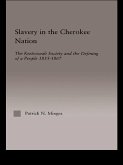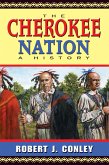"We believe by blood only," said a Cherokee resident of Oklahoma, speaking to reporters in 2007 after voting in favor of the Cherokee Nation constitutional amendment limiting its membership. In an election that made headlines around the world, a majority of Cherokee voters chose to eject from their tribe the descendants of the African American freedmen Cherokee Indians had once enslaved. Because of the unique sovereign status of Indian nations in the United States, legal membership in an Indian nation can have real economic benefits. In addition to money, the issues brought forth in this election have racial and cultural roots going back before the Civil War.
Race and the Cherokee Nation examines how leaders of the Cherokee Nation fostered a racial ideology through the regulation of interracial marriage. By defining and policing interracial sex, nineteenth-century Cherokee lawmakers preserved political sovereignty, delineated Cherokee identity, and established a social hierarchy. Moreover, Cherokee conceptions of race and what constituted interracial sex differed from those of blacks and whites. Moving beyond the usual black/white dichotomy, historian Fay A. Yarbrough places American Indian voices firmly at the center of the story, as well as contrasting African American conceptions and perspectives on interracial sex with those of Cherokee Indians.
For American Indians, nineteenth-century relationships produced offspring that pushed racial and citizenship boundaries. Those boundaries continue to have an impact on the way individuals identify themselves and what legal rights they can claim today.
Race and the Cherokee Nation examines how leaders of the Cherokee Nation fostered a racial ideology through the regulation of interracial marriage. By defining and policing interracial sex, nineteenth-century Cherokee lawmakers preserved political sovereignty, delineated Cherokee identity, and established a social hierarchy. Moreover, Cherokee conceptions of race and what constituted interracial sex differed from those of blacks and whites. Moving beyond the usual black/white dichotomy, historian Fay A. Yarbrough places American Indian voices firmly at the center of the story, as well as contrasting African American conceptions and perspectives on interracial sex with those of Cherokee Indians.
For American Indians, nineteenth-century relationships produced offspring that pushed racial and citizenship boundaries. Those boundaries continue to have an impact on the way individuals identify themselves and what legal rights they can claim today.
Dieser Download kann aus rechtlichen Gründen nur mit Rechnungsadresse in A, D ausgeliefert werden.









